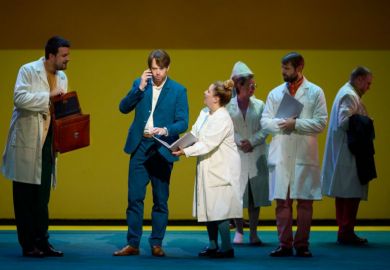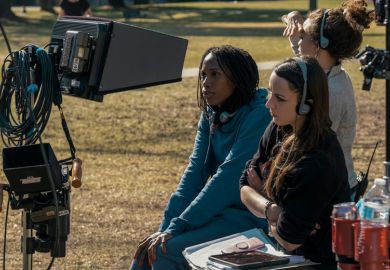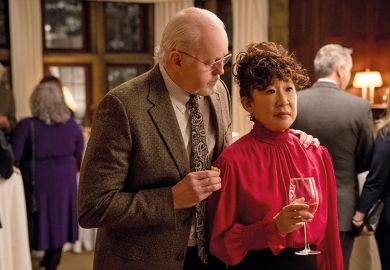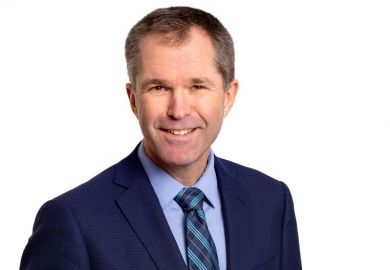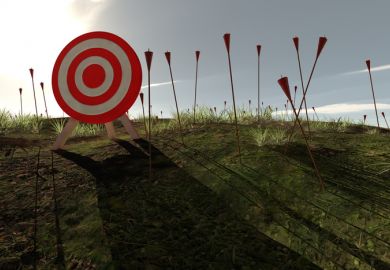After the runaway global success of Game of Thrones, the show’s creators have returned with 3 Body Problem, which tells the story of five friends who obtained their doctorates in physics at the University of Oxford.
The latest offering from Dan Weiss and David Benioff, co-authored with Alexander Woo, is no ordinary campus drama, as the scientists go on to battle an alien invasion. But since the show touches on various aspects of academic life, how close to reality is it on this front?
Based on the acclaimed novel of the same name by author Liu Cixin but replacing Chinese scientists with a global cast based in the UK, of the five physicist friends now in their early thirties, one runs a multimillion-pound business unrelated to science (selling crisps), one runs a spin-out company developing nanofibres, one teaches physics, and two are still in academia.
Two of the group have a complicated romantic entanglement and another two used to be a couple. “When you’re doing a PhD together in a group like that, you are incredibly close. You see each other every day, all day…the fact that some are sleeping together and some have unrequited love for each other all seems fairly plausible,” said Matthew Kenzie, associate professor in high-energy physics and data-intensive science at the University of Cambridge, and the scientific adviser to 3 Body Problem, which is airing on Netflix.
The close friendships and collaborative working that take place reflect the nature of modern science, as opposed to portrayals of the “lonely, socially aloof” geniuses who lack social skills in films such as Good Will Hunting, Dr Kenzie said. “If you’re an early career academic you need to be able to fund your science somehow. So you need to be able to communicate your science,” he said.
The importance of being able to communicate scientific ideas is reflected in a scene in which the character Jin Cheng, a physicist at Imperial College London, played by Jess Hong, is robustly challenged by a room of Nobel prizewinners. The scene was inspired by academic conferences, Dr Kenzie said, where “those kinds of interactions are quite common, nothing is sugar coated”.
In one scene the two women are approached by a man in a bar who quickly leaves when they explain their jobs. Claudia de Rham, a real-life theoretical physicist at Imperial, said she has had similar experiences. Telling people she is a professor of physics can “create a distance, very much so”. Occasionally, when she tells people she’s a physicist, “the conversation stops there. They decide that they can’t communicate with me any more.”
The friends occasionally compare each other’s intellectual abilities. Two of the characters criticise themselves for their current positions: one is a teacher and the other is a researcher in another scientist’s lab rather than running his own. Jack Rooney, the character most successful in financial terms – played by Game of Thrones star John Bradley – is not deemed the most successful by the group.
Professor de Rham said this rang true. “There is this sense that the currency is not how wealthy you are, the currency is how smart you are,” she said. The perception that anyone who drops out of academia is a failure is common, but unhelpful and untrue. “There’s still a little bit this feeling that either you make it, or you’re out,” Professor de Rham said.
In one scene, the idealistic Auggie Salazar, chief science officer at a spin-out creating the world’s finest nanofibres, played by Eiza González, watches as her technology (“3,000 times finer than human hair”) is used to kill people. It is perhaps an extreme version of an ethical dilemma faced by scientists working on dual-use technology. “Real-life people have these moral conflicts, where you’re developing an idea, you accept some funding, and you may believe that the funders have your same interests at heart when you go into the project, but they decide that the commercially viable option is to have a contract with the Ministry of Defence or whatever it is,” said Dr Kenzie.
One area in which the show is not an accurate reflection – along with, perhaps, Hollywood-style looks – is diversity. Two out of the five are female and the same proportion are ethnic minorities. “We are a white and male dominated industry in general in academia, and physics is particularly bad for that,” Dr Kenzie admitted. “I don’t really have a problem with that being represented more diversely in a TV show though, because I think it can help to promote [physics] to underrepresented groups.
“My dream outcome is that in 10 years’ time I interview someone to come to Cambridge who says, ‘The reason I wanted to do physics is because I watched this show.’”
Perhaps the most positive depiction of academics to come out of the show is that they’re sought after and trusted by those in power. When it comes to an extreme threat to the future of humanity, it’s the scientists who might save the world.
POSTSCRIPT:
Print headline: Is 3 Body Problem accurate on academia?
Register to continue
Why register?
- Registration is free and only takes a moment
- Once registered, you can read 3 articles a month
- Sign up for our newsletter
Subscribe
Or subscribe for unlimited access to:
- Unlimited access to news, views, insights & reviews
- Digital editions
- Digital access to THE’s university and college rankings analysis
Already registered or a current subscriber? Login


